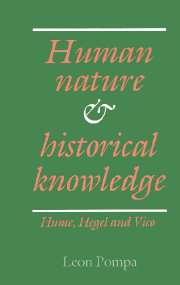2 - HEGEL: THE SELF-DEVELOPMENT OF REASON
Published online by Cambridge University Press: 31 October 2009
Summary
INTRODUCTION
Hegel's approach to the problems involved in the nature of historical knowledge is, like Hume's, part of an account of the nature of all knowledge whatsoever. However, the connection between history or, at least, philosophical history and philosophy, is so close in Hegel that neither can be understood without the other. For this reason, I shall not outline in advance any other aspects of his thought but will concentrate almost exclusively upon his notion of philosophical history, examining its relationship to other aspects of his philosophy as and when the relevant points arise.
Although most of Hegel's works have a very important historical dimension to them, his one principal attempt to specify his idea of history in detail is contained in his Lectures on the Philosophy of World History and, in particular, in the lengthy Introduction to that work, in which he explains the conceptions basic to his approach. It is a curiosity in the literature, however, that although there is no disagreement among Hegel scholars concerning the fundamental importance which he attached to history, in particular to the history of consciousness, very few studies have been based upon this text. In place of a direct examination in its own right, it is usually discussed indirectly because of the light which it can throw upon the importance of the historical dimension in Hegel's other works. This has resulted, however, in the comparative neglect of important aspects of Hegel's whole notion of philosophical history.
- Type
- Chapter
- Information
- Human Nature and Historical KnowledgeHume, Hegel and Vico, pp. 67 - 132Publisher: Cambridge University PressPrint publication year: 1990

